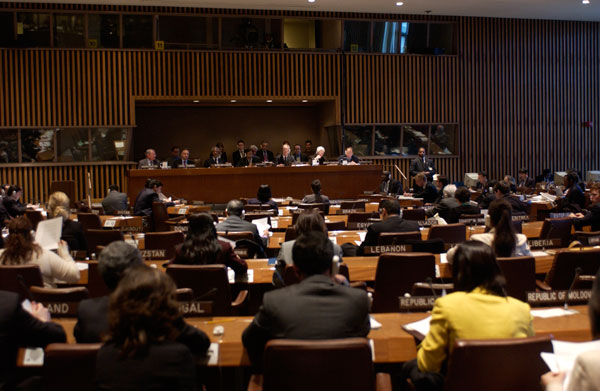Pre-Summit Report: Was Russia or USA the cause of the Cold War?
Poland’s geographical position became a key component that determined the Soviets’ strong political stances in the Cold War. Poland had two forms of government, both communist and democratic, while wrestling control from the Nazis. Josef Stalin, dictator of the Soviet bloc, wanted the communist government to reign supreme whereas the Churchill and Roosevelt disagreed and wanted to give the people the right to choose their own form of government.
 |
| This Russian cartoon shows Greece being helped out by
America’s “democracy”. It shows Stalin’s view on the non-communist ideology. |
At the Yalta conference in 1945, when the United Nations was created, Stalin insisted that Poland is a “question of life or death for Russia”, and was able to win Churchill and Roosevelt’s acceptance of a communist-dominated provisional government for Poland. Stalin then altered the election results and brought up a communist rule in Poland.
When President Franklin Roosevelt died of an unexpected brain haemorrhage in 1945, his Vice President Harry Truman took over his position as the president. Probably unknowing of the sacrifices made at Yalta, Truman viewed the later interventions of the Soviets into Eastern Europe as violations of the Yalta treaty, defacing Stalin as a liar. He took to blocking out the spread of communism under Stalin’s power craze, turning containment of communism into a dominating component of the American foreign policy. Thus, the Cold War began.
Texts from traditionist American historians during the cold war era would clearly state that the USSR had started the cold war to propagate a communist ideology and rule a world government. Trying to negotiate against an oppressive dictator like Stalin hadn’t worked before, causing a massive world war 2, and it wouldn’t work then. America was forced to enter the cold war to protect their freedoms of democracy and avoid a totalitarian conquest. After the Vietnam War, however, historians were disoriented by the dishonest American government, and told a different tale. Stalin was no longer a sadistic warmonger, but instead a man who wanted to defend the Soviet Union in a world dominated by “Democracy”, and retain his stance of power. It now became clear that the American interest in culling Soviet influence by means such as the atomic bomb were to seek out other economic goals without obstructions from the Soviet bloc, were the main reasons to start the cold war.
“For 40 years we were led to think of the Russians as godless, materialistic and an evil empire. When the Cold War ended, we suddenly discovered that Russia was a poor Third World country. They had not been equipped to take over the world. In fact, they were just trying to improve a miserable standard of oppressive living, and couldn’t. They had to spend too much on arms build-up. We didn’t win the Cold War; we bankrupted the Russians. In effect, it was a big bank exhausting the reserves of a smaller one.” Norman Mailer, 1995
By,
Aditya Katakol
Reporter
SYRIA-PARIS PEACE CONFERENCE







